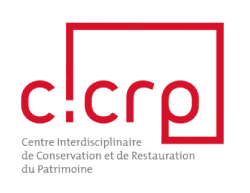
The Reception of Works in Restoration
As part of its assistance mission, CICRP welcomes paintings on all types of media, including large formats, graphic art, and sculptures belonging to a collection or public heritage institution or protected by the Historical Monuments title for preliminary studies or restoration projects.
Restorations or preliminary studies are carried out by independent restorers chosen by the contracting authorities in accordance with procedures or public contracts of public procurement law and the French Heritage Code.
CICRP makes the material, technical, and scientific environmentavailable for the restoration of works which supports and documents the operations conducted in its workshops. The Center produces a scientific imaging file (face and reverse, raking, UV, black and white infrared and false colors, details, macrophotography and potentially radiography). CICRP can also provide, if the operations require it during treatment, physico-chemical analysis (light and electron microscopy, spectrometry, chromatography, elementary chemical analysis) thanks to its scientific equipment and depending on the issues identified before or during the study.
CICRP can support the owner at various stages of the restoration project. CICRP ensures the stay of the work and monitors its restoration.It coordinates all stages of the operation for the in-house works in conjunction with the owner and the restorer. The restorer benefits from the equipment and the scientific documentation provided by CICRP.
Painting/Graphic Arts: The Reception of Works in Restoration
In the field of painting and, more rarely, graphic arts, CICRP supports the applicant and the work in various stages of the operation, by opening its workshops to the restorers chosen by the owner and by putting its skills at the service of work to be restored. CICRP ensures the stay of the work and monitors its restoration.
1. In Advance of the Restoration Project
CICRP can help the owner to design and specify the operation chain. It can:
2. Before the Restoration
If the work is already on its premises, CICRP welcomes the restorers to come and see it.
The preliminary restoration study is also carried out in the workshops by the conservator-restorer appointed by the owner. If the need has been defined with the client, CICRP can also support the conservator’s preliminary study with a scientific study.
3. The Restoration
The restoration is scientifically and technically monitored by CICRP teams. During the intervention, meetings are held in front of the work to bring experts together like the restorer in charge of the work, the head of the scientific center, and the photographer and engineers concerned with the conservation issues observed around the work. During these meetings, it may be decided to call on the skills of chemical engineers to carry out analysis that will answer technical questions posed by the work. The owner is invited to these meetings and regularly receives information on the progress of the operation.
Imaging
Each work entering CICRP is the subject of a complete imaging file (direct light, raking, UV, infrared, false-color infrared, and, if applicable, radiography) made available to restorers. If necessary, additional photographic examination can be made during the restoration.
Analysis
The restorers have access, when appropriate, to the scientific study by CICRP and they benefit from the analysis carried out by the engineers at the laboratory. he latter can carry out additional analysis during restoration in agreement with the owner and the head of the scientific center. Non-destructive analysis without sampling (micro-florescence X) are preferred. If one or more samples are necessary, a request is made to the owner in advance.
Two scientific imaging computer stations make it possible to consult all the files produced by CICRP photographers from the workshops. The documentation center offers restorers the opportunity to access a set of reference books and periodicals concerning the conservation and the restoration of heritage.
CICRP submits a complete file to the contracting authority including the scientific imagery produced at the start and the end of the restoration or study as well as, when applicable, the scientific analysis reports carried out by the laboratory engineers.
Requests for accommodation for the study and/or the restoration of a work should be made to CICRP management (info@cicrp.fr). The reception of works is the subject of an agreement specifying the content and the conditions of a CICRP intervention.

